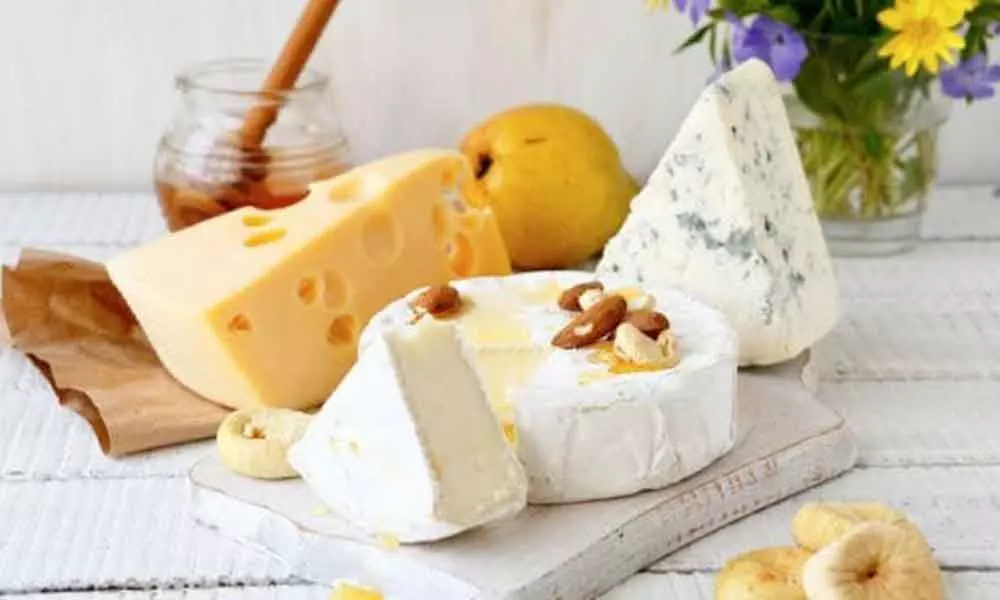Live
- KCR has public support, claim Ponnala, Vinay Bhaskar
- Attada’s novel on Srikakulam struggle lauded
- DGP inaugurates Bharosa centre
- Sand-laden heavy lorries damage roads
- Naini describes CM as real hero; says he will deliver a blockbuster
- PM awarded Kuwait's highest honour
- TTD’s ambitious path with 'Vision 2047' for Tirumala future
- After temple, ASI discovers 150-yr-old stepwell in Sambhal
- Govt to launch 3 apps to protect consumers in digital marketplace
- NDA to fight Bihar polls with Nitish as CM face
Just In
Cheese is rich in calcium, and if you do decide to eat, always choose natural cheeses

I am going to address a food, which is highly controversial and that has gained a lot of attention in the last couple years; cheese. On one end, it is considered a convenient and nutritious snack but on the other end, like everything else, cheese has its own drawbacks.
Often, people think that vegetarians lack protein, and, in the process, they add various forms of cheese to their diets. Let me bust the myth - vegetarians do not lack in protein. There are plenty of great sources of protein in the plant kingdom. Additionally, you must remember that one needs only 0.8 grams of protein per kilogram of their body.
Various diets like high-protein, ketos, high fat etc. have increased the hoop-la around cheese. And vegetarians have taken to it like a cat takes to cream. Nonetheless, if you do decide to eat cheese, always choose natural cheeses over processed cheese. The reason for this is because while processing cheese, chemicals, additives and substitutes like food colour, tenderizers and emulsifiers and excess salt are added to increase their shelf life. Fast foods normally use processed cheese and can create havoc on our mind and body. While cheese that is fermented naturally is what real cheese is about and this process dates to over 4000 year. Cheese made from A2 cow's milk would be even less harmful to the body than processed cheese.
Cheese is a concentrated source of calcium, but most types are high in fat and must be eaten sparingly. It also provides protein and vitamin B12. Cheese may also help to fight tooth decay caused due to sugary foods. It seems to work by preventing the formation of acids in the mouth which attack the enamel on teeth. Some of the naturally processed cheeses easily available in India are paneer, cottage cheese, feta cheese, mozzarella cheese, goat cheese and halloumi. Feta and mozzarella remain most fresh when stored in water.
You must note that there is a difference between cottage cheese and paneer. The difference is that paneer has no salt or cream while cottage cheese has salt and may or may not contain cream.
Be careful of the fat content of some cheese; for example, cheddar cheese contains 6 times as much saturated fat as sirloin steak. High intakes of saturated fat are known to increase blood cholesterol levels, which in turn can contribute to Atherosclerosis- a major factor in heart disease and strokes.
Some people are susceptible to having allergic reaction to cheese due to intolerance for dairy products. If they do consume cheese it can lead to various diseases like eczema, migraine and ear infections.
Please keep in mind that even though cheese can be beneficial due to the protein and vitamin B12 content, it must be had in small quantities only. Additionally, if you are eating cheese, you must not eat any other protein such as paneer, dal, chicken or fish as mixing of proteins is not a good idea.
Typically, cheese is served on a platter with olives and/or bread. However, from the point of view of nutrition that is not the ideal way to eat cheese as olives and cheese are both fatty foods. Instead, eat the cheese with vegetables. For example, cheese would taste great with roasted or sundried tomatoes.
On the other hand, do not mix cheese with iron-rich vegetables as it can lower the iron content by 50% and take away from the nutrition of the vegetable. So avoid broccoli with cheese or palak paneer as the principle is the same.
So enjoy your cheese, but do so mindfully!

© 2024 Hyderabad Media House Limited/The Hans India. All rights reserved. Powered by hocalwire.com








